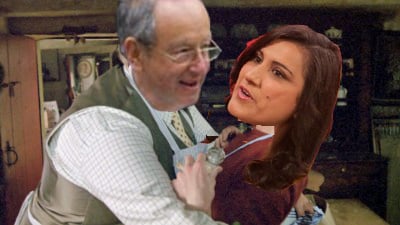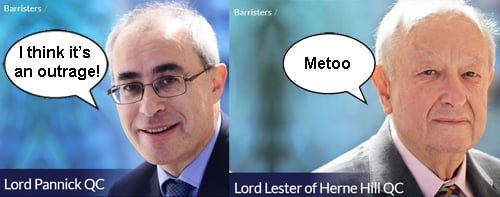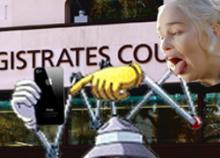Blackstone Chambers has stood by Lord Lester, a member and Liberal Democrat peer accused of sexual harassment, while another of its barristers has intervened to save his skin in the House of Lords.
Lester was set to be suspended by the House of Lords until the intervention on Thursday of Lord Pannick, a fellow Blackstone barrister, who won a vote to refer the matter back to the Committee for Privileges and Conduct. He did so on the basis that its commissioner, former Law Society President Lucy Scott-Montcrieff, failed to act "in accordance with the principles of natural justice and fairness" when dealing with Lester's case.
Lester, a human rights lawyer who in recent years has acted for Scientology, was accused by Jasvinder Sanghera, a campaigner against forced marriage and the founder of the charity Karma Nirvana, of harassing her a decade ago. Saghera surrendered her right to anonymity this week to encourage, she said, any other victims of Lester to come forward.
Sanghera made her complaint in November last year. She claimed that when she missed her train after a meeting with Lester at the House of Lords, he insisted she stay the night at his London home. On the drive there, "He kept repeatedly missing the gearstick with his hand and instead very firmly placed his hand on my right thigh", she said.
"The first time it happened I thought it must’ve been an accident, but when it continued I realised it was not. I removed his hand and asked him to stop. He just smiled. I felt incredibly uncomfortable knowing that I was on the way to staying at his house. He continued to grope my thigh for the length of the journey, despite my protests."
After a cup of tea with Sanghera and his wife, the barrister showed her to her bedroom. Sanghera said he explained that "it was not far from his bedroom, which he insisted on pointing out to me, saying he would not be far from me". Sanghera called a friend to say she felt trapped, and on their advice she jammed a chair against the door and went to bed fully clothed.
The following morning, after Lord Lester's wife had left the house, Sanghera said the peer "came up behind me and put his arms around my waist".
"I pushed him away. Again, he placed his arms around me and further up my body. I had to force myself away. He pursued me around the kitchen and I pleaded with him to stop. Once he stopped, I told him that I wished to leave".
Before driving her to the station, he told her "he had strong feelings for me" and "insisted on showing me his shed" (surely a suspending offence all by itself).

In a subsequent meeting at the House of Lords, Lester told Sanghera he would make her a baroness if she had sex with him, she said, and that he could ruin her if she refused. "He said, 'if you sleep with me I will make you a Baroness within a year'...He even spelt it out putting my surname in, and asked me how that sounded".
Sanghera alleged that Lester then began pointing out peers and commenting "on the reasons they have reached the positions they were in – including that one individual had slept with someone, another had relatives and good connections, and so on". He also allegedly "made reference to the colour of the carpet" and said "that only members of the House of Lords are allowed to walk on the red carpet and the 'commoners' were to walk on the blue carpet". Sanghera said the impression he conveyed "was that he was a man of power who could make things happen and that I was powerless in comparison".
Lester warned her, she said, that unless she was a "good girl" who agreed to sleep with him, he would "see to it that I never had a seat in the House of Lords". He "warned me that there would be other repercussions for me", before making "a number of further inappropriate sexual comments to me such as that he could see me becoming a demanding mistress".
Sanghera said that she immediately phoned friends including a district judge, a senior British embassy diplomat and a director of the CPS to tell them what had happened, all of whom confirmed her account to the committee as witnesses.
She said she was subsequently frozen out of Lester's campaign, but decided not to make a complaint until last year, when she heard how an intern in the House of Lords had reported a similar experience against a different peer and became convinced that she had to act.
In his defence, Lester presented the ten year delay as evidence of its falsehood. Sanghera called the suggestion "surprisingly self-serving...given his area of expertise" and said that Lester appeared "to fail to understand the thought processes of victims”. Lester also argued that Sanghera's lack of obvious distress at his home suggested he was innocent. "She does not explain how her apparently normal appearance and behaviour were compatible with her allegations of seriously distressing sexual misconduct the night before”, he said.
Describing himself as a "happily married man", Lester presented his spotless record with women as further evidence of his innocence. "Had I been guilty of these things, there would be likely to be other women coming forward in the past nine months. People who abuse their power with sexual assault are likely to have many victims. I have none." Lester outlined his professional work promoting equality for women, suggesting that while it “does not prove my innocence", it "demonstrates the inherent unlikeliness of the complainant’s allegations being true”.
Asked to explain why Sanghara would have lied to her witnesses about the incident and then waited ten years to make a complaint, Lester said, “I wish I could. I speculate and I speculate". Later on, in an apparent outburst, he alluded to a conspiracy involving Sanghera and her witnesses, claiming that it was "a pack of lies told by her and her supporters".

A central plank of Lester's defence and his subsequent appeal was the House of Lords' Code of Conduct, which he argued was not designed to investigate sexual harassment and was therefore inapplicable. In the committee's report, Scott-Moncrieff, the Commissioner of Standards, said that Lester appeared to believe that "whether or not the allegations were true, he should not have been subject to investigation". She pointed out that in 2009 Lester made a speech in favour of the suspension of other misbehaving peers in which "he vigorously defended the processes which he now seeks to undermine".
Concluding that there was no "plausible reason" why Sanghera or her witnesses would have lied, and that "she was more likely than not to have been telling the truth", the committee recommended that Lester be suspended until June 2022.
Scott-Moncrieff also claimed that Lester harassed her own staff. "Lord Lester bombarded my office (sometimes several times a day) with demands that I should complete the investigation quickly and exonerate him", she said. Calling the Blackstone barrister's behaviour "grossly inappropriate", she described how her clerk "bore the brunt of the harassment". He was also criticised for leaking Sanghera's name to another Lord. Lester called the investigation a "nightmare", describing how The Sun "called me 'Lord Mo-Lester'".
Before leading 101 peers to vote against the suspension, fellow Blackstone barrister Lord Pannick told The Times, “Parliament has applied a procedure that would be invalidated by the courts if Lord Lester were to be suspended by his local darts club”. Which perhaps explains why Blackstone Chambers is standing by its man. “We take any allegations of sexual harassment made against members of Chambers or staff extremely seriously", a spokesman told RollOnFriday, "and have strict internal policies and procedures in place to ensure they are dealt with properly". Asked whether Chambers had received any other complaints, he said, "To the best of my knowledge, no complaints have ever been made to Chambers about Lord Lester’s conduct".














Comments
954
877
Which darts club does Lord “the Power” Lester belong to?
1007
855
Mediation would be a better way to resolve this situation.
935
959
Grim
1163
958
The record of the debate yesterday is fascinating reading:
https://hansard.parliament.uk/lords/2018-11-15/debates/2833F584-59E3-4E3E-89E0-4F67CEDD6635/PrivilegesAndConduct
1331
892
It is so hard. Having read that it just appears really genuine that it happened like that. It accords so much to type with this kind of man too. I am surprised she continued to his home after he put his hand on her knee in the car however. I would have left the car. The fact she called people that night and told them does tend to go to her story being credible.
1421
992
Lydia, you have some good points but your repeated (this and other comments) references to what someone 'looks like' or their 'type' as evidence of their guilt or innocence is utterly wrong. I suggest you reflect on this obvious flaw, perhaps discuss with others to help you understand, and try to do better.
1306
1038
@Lydia - its a difficult one, its certainly possible, you touched on some reasons for and against it being true. The 10 year delay in raising the complaint and the message on the book raise questions though. There may be valid answers, but questions nonetheless.
1401
973
Lydia, when you say "this kind of man", what kind, specifically, are you referring to? Barristers? People in their 70s? Human rights lawyers? Wearers of glasses?
1372
951
Having read the Hansard link, I am unpersuaded that x-examination was needed,and feel it was well within the scope of the commissioner's discretion to choose not to permit it. The credibility of opposing witnesses is largely determined with reference to corroboration, of which there was plenty.
These lords were entirely unconvincing in disguising this closing of ranks as concern is for due process
1320
978
Strongly disagree, Human. Have you read the report? The complainant doesn't come across wholly well, shall we say. The report then goes on to fudge its findings by concluding that although her evidence was mistaken in several crucial respects, they would nevertheless believe her about all of the other points on which there was no corroborative evidence either way.
Compare and contrast the approach that would be taken in any civil or criminal court. Where a witness is found to be mistaken, it is usually the case that the remainder of their evidence will be treated extremely cautiously, and may often only be accepted where it is corroborated elsewhere.
All of this ignores the stand-alone, fundamental injustice that attends on the complainant's evidence not being tested by cross examination. That is basic.
1254
962
@Human - 78 members agreed with you, 101 didn't. You call it closing ranks, others will call it democracy and say that you're stamping your feet because the result didn't go your way.
1148
916
Having read that it just appears really untrue that it happened like that. It accords so much to this type of woman too.
1131
1001
No amount of debate around innocent or not, does justice to this point_ why would Jasvinder want to put herself through this? i would argue that it is time and was the right time for her to be raising such injustice for women who represent according to Lord Lester..equals . If that is agreeable as I know and hope it is to many women and men-then our society should be thankful to women like this for their brave and courageous stand.
1191
890
@Jas - we don't know why the complaint was made or why there was a delay in making it, but these would be (and were) considered as part of the investigation. Neither of them on their own are reasons to leap to conclusions though.
1067
898
Anon above: notwithstanding your correct assertion that I have not read the actual report, it seems to me that the fact that the report details how "her evidence was mistaken in several crucial respects" is itself prima facie evidence that cross examination would have added little or no value.
Personally, I would have found it suspicious if her evidence did not contain substantial confusions and inaccuracies given the passage of more than a decade of time - it would have seemed to me to be evidence of an entirely synthetic memory. Equally, I am open to the conclusion that given the passage of time her recollection may be too poor to have any evidentiary value whatsoever.
It is true that where witnesses are unreliable, even on immaterial matters, whether deliberately or due to the imperfect workings of human memory, the entirety of their testimony is imputed.
However, here her evidence is corroborated by multiple accounts of people she confided in at the time. That reverses any doubts about the veracity of her material recollections.There was no serious challenge to the integrity or recall of these corrobarating witnesses.
1071
945
@Human - the right of cross-examination is a fundamental one in cases such as these where only two people know what happened and it is necessary to challenge the evidence given by the accuser. Whether or not cross-examination adds value can only be judged once it has taken place, it can't be dismissed as worthless before it has even been allowed to happen. Given the added factor of the passage of time it could be, as you say, that her recollection may be too poor to have any evidentiary value whatsoever, cross-examination would help determine this. While it is undoubtedly true that there are likely to be errors in memory after a period of time, which in this case was substantial, I think it is a leap too far to argue, as you appear to be doing, that unreliable evidence is almost a good thing and a sign that the accuser is telling the truth, but yet a reason why she shouldn't be cross-examined. All the witnesses' evidence shows, if true, is that the accuser spoke to them at the time, it does not mean that what she told them was true. Remember, there has also been no serious challenge to the integrity or recall of Lester's witnesses either.
Remember that the very question of whether process was fair without cross-examination was put to the vote, and 78 members felt as you do, but 101 felt that it was unfair. So the matter has been looked at, and the majority has decided that without cross-examination in this case the process was unfair. I think that the hurdle people still arguing that the process was fair after this vote face is that they are open to being accused of sour grapes because the vote went against them. I'm sure some people do genuinely feel that the process was fair, but there are others who don't care as long as they get the result they want to see, and others who feel that the process was deeply flawed.
1083
935
The applicable rules specifically did not give an automatic right of cross examination. It could be that theoretically a great John Grisham style "gotcha" moment would arise under adversarial cross examination which would not be apparent under the more forensic style adopted. But you and I and Lord Pannick would struggle to envisage such a moment - because any errors are equally consistent with the limited recall of events 12 years ago as today as with deceit.
The substantial errors you report are clearly irrelevant. What matters is that beyond reasonable doubt the woman concerned did 12 years ago spend a night in Lord Lester's house, and did contemporaneously report being sexually harassed and propositioned. Her later failure to recall events accurately do not at all alter the overwhelming preponderance of evidence to this effect.
The question as you then state is quite simply this - 12 years ago, was the woman lying? In the absence of any discernible motive such as a pattern of making false accusations I would answer that I believe her accusation more than his denial ("he would say that wouldn't he").
This is not a case of "#IBelieveHer". It is a case of following the preponderance of evidence
It is highly relevant that Lord Lester was in an inequitable position of being a personal friend and colleague - this was literally a jury of his peers. These peers substituted their own judgements for that of the investigating officer and committee in a way I find offensively entitled.
1002
905
On the balance of probabilities, I believe her.
1039
830
@Human - The rules don't preclude cross-examination if it necessary for natural justice. First rule of any investigation of this type is just because you can't think of a reason for someone to be lying, that doesn't mean that they aren't lying. It is not whether she told people that needs to be examined, but whether what she told them was true. Your problem remains that it sounds as if you're criticising the result of the vote just because it didn't go the way you wanted it to.
900
860
@believe her - you don't believe all the allegations on the balance of probabilities as it has been proven that some of them were wrong. Which ones do you believe?
870
804
Anon - I appreciate the point you are making. However the contention that, however remote the possiblity that it will bring any useful results, cross examination is a defender's right in all circumstances is explicitly in contravention to the applicable rules. Cross examination should be a test the veracity of a witness' account while in this case her testimony was of limited evidentiary value in any case - the accounts of the corroborating witnesses were far more powerful in establishing the uncontested facts I paid out above.
The commissioner held that complainant's account was more credible on the balance of probabilities as she had no motive to lie to the corroborating witnesses. It isn't impossible for her to be lying nevertheless; it is contentious whether that possiblity is so remote as to be beyond reasonable doubt; but it certainly the preponderance of the evidence was that the complaints she made at the time were just.
This was not just my conclusion. It was that of the independent commissioner and the investigating committee. Lord Lester's mates substituted their judgements entirely inappropriately for that of the independent investigators. Their approach was obviously offensive to justice
906
773
@Human - agreed, cross-examination is not a right in all circumstances, but it is necessary in this type of case and is not precluded by the rules if it necessary for natural justice. It is wrong to say that the facts weren't contested, they were. It is the first rule of any impartial investigation that you don't assume someone is telling the truth just because you don't know why they wouldn't be. 101 peers overturned the Commissioners and Committee's decision. Your problem remains that by labelling those peers as'Lester's mates' or 'offensive' it looks as if you're criticising the vote just because it didn't go the way you wanted it to.
859
822
"It is wrong to say that the facts weren't contested, they were."
There was no contest to the fact that the complainant complained to several other people 12 years ago. The disputed facts are whether she was telling the truth in making that complaint.
All Lord Lester's witnesses were character witnesses.
"It is the first rule of any impartial investigation that you don't assume someone is telling the truth just because you don't know why they wouldn't be."
You just made that rule up. It's utter cant, with no rational basis. Of course, motive is important to an impartial assessment of the credibility of a witness.
I find it incredible that anyone genuinely concerned for natural justice would consider it appropriate to overturn an independent investigation into the conduct of their mate.
841
834
Anon - what I'm struggling to understand from you and Lord Pannick is precisely in what circumstances cross-examination is a right.
899
764
@Human - that's right, there were disputed facts as to whether she was telling the truth. That's what cross examination might help resolve. Its the first rule of any impartial investigation that just because you don't know of a motive doesn't mean there isn't one - this is basic stuff. If the conclusion of the investgation was that she didn't do it because the investigator couldn't find a motive then the process has been deeply flawed. You're still talking about 'mates', the problem you have when you do that is that it looks as if you're criticising the vote just because it didn't go the way you wanted.
879
777
@Human - cross-examination is necessary in this type of case, otherwise the process is unfair. Presumably Lord Pannick and the other peers who voted for the amendment felt the same.
826
850
I'm not sure what you think that a conclusion predicated on an assessment of the motives of a witness is deeply flawed, and your argument (perhaps clumsily phrased) that where an investigation of a witness uncovers no motive to lie had been identified is indicative of a flawed investigation is simply outrageous. Lord Lester and his mate Lord Pannick denied Lord Taylor of Blackburn a right to cross examine the journalist over exactly what influence he was alleged to be peddling for cash and denied the journalist's assertion that he would agree to influence legislation. Lord Taylor 's defence is that he had never meant it. I don't see how denying Lord Taylor a right of cross examination of that journalist is consistent with granting that right to Lord Lester.
It is fundamental to natural justice that the forum be independent and not even give the appearance of bias. Lord after lord stood up, declared that they were biased as personal friends of Lord Lester, and then considered it appropriate to vote in proceedings on the grounds of their commitment to natural justice. I find it much more credible to believe that they voted because of their commitment to their peer.
843
764
@Human - first rule on any investigation - don't assume that there is no motive just because you don't know what the motive is. The vote wasn't about whether cross examination was always necessary, it was about whether it was necessary in certain circumstances. 101 peers felt it was, 78 felt it wasn't. To accuse all 101 (including the female peers who supported the amendment) of being 'Lester's mates' just sounds like you're stamping your feet because the vote didn't go the way you wanted it to.
825
744
Nobody assumed there was no motive. They concluded after investigation and inquisitorial examination of the witnesses that the only credible motive was that the allegations were true.
Thank you for implicitly accepting that those of the 101 who were mates of Lord Lester did not vote in Lord Lester's interests because of their devotion to justice, and should not have voted. There's nothing in the way I point out obvious flaws in the administration of justice which indicates any preconceived bias.
782
706
@Human - a fundamental problem with this investigation is that it failed to establish a motive and because of this made the assumption that the allegations were true. I don't implicitly assume that those of the 101 who were mates of Lord Lester did not vote in Lord Lester's interests because of their devotion to justice, and should not have voted, not do I implicitly assume anti-male bias in those of the 78 and voted against the amendment. Referring to 'Lord Lester's mates' and 'offence to justice' does indeed indicate a preconceived bias, and sounds like you're stamping your feet because the vote didn't go the way you wanted it to.
663
720
The only person making assumptions is you. You assume a priori an anti male bias. That the complainant is a liar. You assume there must be a motive other than telling the truth. We are told by George Orwell that to see what is in front of your nose takes constant effort, and you do seem to be a fantastic case in point.
727
636
@Human - I make no such assumption. The first rule of any investigation is not to make assumptions about motive just because you don't know what the motive is. You still sound like you're stamping your feet because the vote didn't go your way.
726
718
What evidence is there that the investigation had a preconceived assumption, rather than a final conclusion after due deliberation, that the witness' motive was that she was telling the truth? Because the way you phrased yourself repeatedly was that the conclusion that she was telling the truth - clearly a conclusion which makes you feel uncomfortable - was itself evidence of a preconceived investigation. It's not a conclusion you or Lester, or his mate Pannick (and I won't apologise for pointing out the inappropriateness of having your mate weigh in on your own misconduct proceedings) have been able to challenge except by reference to entirely vague and remote hypotheticals about an unknown something that might perhaps come to light under adversarial cross-examination and that hasn't already been revealed under the inquisitorial system. I'm calling BS on this.
707
674
@Human - the evidence is in the reports, which you said you hadn't read. If the investigation had a preconceived assumption then I doubt it would just be me who would be 'uncomfortable'. There was nothing in the nature of the process, be it adversarial or inquisatorial, which precluded cross examination. By talking about Lester's 'mates', it doesn't sound like you:re calling BS, it sounds like you're stamping your feet because 101 peers didn't vote the way you wanted them to.